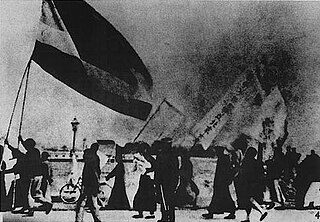
Chinese nationalism is a form of nationalism in which asserts that the Chinese people are a nation and promotes the cultural and national unity of all Chinese people. It is often equated with Han nationalism, although these two concepts are different. According to Sun Yat-sen's philosophy in the Three Principles of the People, Chinese nationalism should be a form of civic nationalism constructed on top of a united value, however this has not been fully recognized or applied in practice by successors.
A workunit or danwei is the name given to a place of employment in the People's Republic of China. The term danwei remains in use today, as people still use it to refer to their workplace. However, it is more appropriate to use danwei to refer to a place of employment during the period when the Chinese economy was not as developed and more heavily reliant on welfare for access to long-term urban workers or when used in the context of state-owned enterprises. Prior to Deng Xiaoping's economic reforms, a work unit acted as the first step of a multi-tiered hierarchy linking each individual with the central Communist Party infrastructure. Work units were the principal method of implementing party policy. The work unit provided lifetime employment and extensive socioeconomic welfare -- "a significant feature of socialism and a historic right won through the Chinese Revolution."
Gavan McCormack is a researcher specializing in East Asia who is Emeritus Professor and Visiting Fellow, Division of Pacific and Asian History of the Australian National University. He is also a coordinator of an award-winning open access journal The Asia-Pacific Journal: Japan Focus.
Benedict John Kerkvliet is Emeritus Professor at the Department of Political and Social Change, School of International, Political & Strategic Studies, Australian National University. He works across the areas of comparative politics, Southeast Asia and Asian studies. Kerkvliet was born and raised in Montana, surrounded by working-class relatives and friends for whom political discussion and debate were part of life. After graduating from the local public high schools, he earned his B.A. at Whitman College and his M.A. and Ph.D. at University of Wisconsin–Madison. He taught at the University of Hawaiʻi at Mānoa) for nearly twenty years before joining the Australian National University in 1992 where he was a Professor and Head of the Department of Political and Social Change, Research School of Pacific and Asian Studies. Kerkvliet currently resides in Hawaiʻi with his wife Melinda.
New Democracy, or the New Democratic Revolution, is a concept based on Mao Zedong's Bloc of Four Social Classes theory in post-revolutionary China which argued originally that democracy in China would take a path that was decisively distinct from that in any other country. He also said every colonial or semi-colonial country would have its own unique path to democracy, given that particular country's own social and material conditions. Mao labeled representative democracy in the Western nations as Old Democracy, characterizing parliamentarianism as just an instrument to promote the dictatorship of the bourgeoisie/land-owning class through manufacturing consent. He also found his concept of New Democracy in contrast with the Soviet-style dictatorship of the proletariat which he assumed would be the dominant political structure of a post-capitalist world. Mao spoke about how he wanted to create a New China, a country freed from the feudal and semi-feudal aspects of its old culture as well as Japanese imperialism.
Lucian W. Pye was an American political scientist, sinologist and comparative politics expert considered one of the leading China scholars in the United States. Educated at Carleton College and Yale University, Pye chose to focus on the characteristics of specific cultures in forming theories of political development of modernization of Third World nations, rather than seeking universal and overarching theories like most political scientists. As a result, he became regarded as one of the foremost contemporary practitioners and proponents of the concept of political culture and political psychology. Pye was a teacher at the Massachusetts Institute of Technology for 35 years and served on several Asia-related research and policy organizations. He wrote or edited books and served as advisor to Democratic presidential candidates, including John F. Kennedy. Pye died of pneumonia at age 86.
Zhang Kangkang(simplified Chinese: 张抗抗; traditional Chinese: 張抗抗; pinyin: Zhāng Kàngkàng; born as Zhang Kangmei, July 3, 1950, Hangzhou) is a Chinese writer.
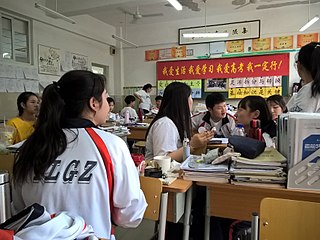
The history of education in China began with the birth of the Chinese civilization. Nobles often set up educational establishments for their offspring. Establishment of the imperial examinations was instrumental in the transition from an aristocratic to a meritocratic government. Education was also seen as a symbol of power; the educated often earned significantly greater incomes.
Lucien André Bianco is a French historian and sinologist specializing in the history of the Chinese peasantry in the twentieth century. He is the author of a reference book on the origins of the Chinese revolution and has co-edited the book China in the twentieth century. His Peasants without the Party was awarded the Association for Asian Studies Joseph Levenson Book Prize in 2003.
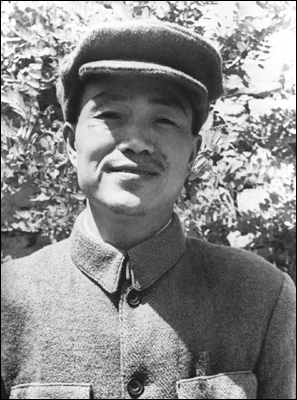
Hu Qiaomu was a Chinese sociologist, Marxist philosopher and politician.
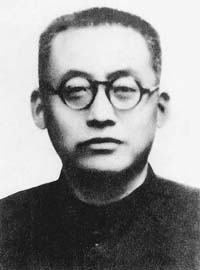
Tao Xingzhi, was a renowned Chinese educator and reformer in the Republic of China mainland era. He studied at Teachers College, Columbia University, and returned to China to champion progressive education. His career in China as a liberal educator was not derivative of John Dewey, as some have alleged, but creative and adaptive. He returned to China at a time when the American influence was zesty and self-confident, and his very name at that time (zhixing) meant "knowledge-action," reflecting the catch-phrase of the Neo-Confucian philosopher Wang Yangming which implied that once knowledge (zhi) had been obtained, then action (xing) would be easy.
Thomas Heberer is a Senior Professor of Chinese Politics & Society at the University Duisburg-Essen, Germany.

Suisheng Zhao is a professor of Chinese politics and foreign policy at the University of Denver's Josef Korbel School of International Studies. He serves as director of the school's Center for China–US Cooperation, and is the founding editor and the editor-in-chief of the multidisciplinary Journal of Contemporary China.
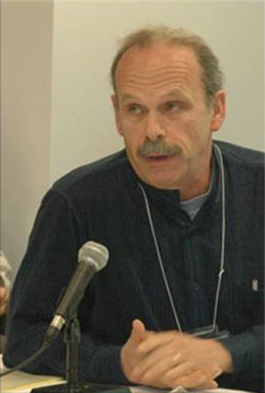
Joshua A. Fogel is an American-Canadian Sinologist, historian, and translator who specializes in the history of modern China, especially focusing on the cultural and political relations between China and Japan. He has held a Tier 1 Canada Research Chair at York University in Toronto since 2005. Before that he taught at Harvard University (1981-1988) and the University of California, Santa Barbara (1989-2005).
Frederick Carle Teiwes is an American-born Australian sinologist. He held a personal chair as professor emeritus in Government and International Relations at Sydney University until his retirement in 2006. He is especially known for his detailed studies, together with Warren Sun, on the history of Chinese Communist Party (CCP) elite politics.

Geremie R. Barmé is an Australian sinologist and film-maker on modern and traditional China. He was formerly Director, Australian Centre on China in the World and Chair Professor of Chinese History at Australian National University College of Asia and the Pacific in Canberra.
Timothy Cheek is a Canadian historian specializing in the study of intellectuals, the history of the Chinese Communist Party, and the political system in modern China. He is Professor, Louis Cha Chair in Chinese Research and Director, Centre for Chinese Research, Institute of Asian Research, at the School of Public Policy and Global Affairs at the University of British Columbia. From 2002 to 2009 he was editor of the journal Pacific Affairs. Before going to the University of British Columbia in 2002, he taught at The Colorado College.

Marlène Laruelle is a French historian, sociologist, and political scientist specializing on Eurasia and Europe. She is Research Professor and Director of the Institute for European, Russian and Eurasian Studies (IERES) at the George Washington University (GW). Laruelle is also a Co-Director of PONARS, Director of GW’s Central Asia Program, and Director of GW's Illiberalism Studies Program. She received her Ph.D. in history at the National Institute of Oriental Languages and Cultures (INALCO) and spent time as a post-doc in the area of political science at Sciences Po in Paris. She is Senior Associate Scholar at the Institut français des relations internationales (IFRI). Her particular focus of interest is post-Soviet political, social and cultural developments, especially ideologies and nationalism.
Joseph Bevan Robertson Whitney was a political and environmental geographer. He was a professor of geography at the University of Toronto, and studied Chinese culture and politics.
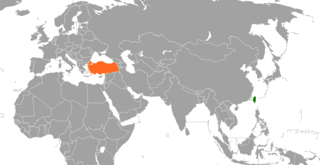
Taiwan–Turkey relations are the foreign relations between Taiwan and Turkey. Since 1971, Turkey maintains non-governmental, working-level relations with Taiwan.








